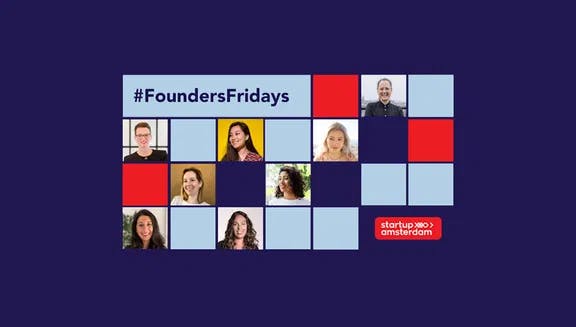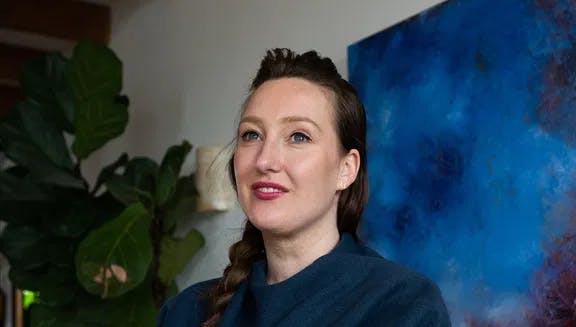#FoundersFridays: Meet Benjamin Webster

#FoundersFridays is a StartupAmsterdam interview series: for entrepreneurs, by entrepreneurs. Each hero answers questions on their entrepreneurial journey, their learnings, milestones and bottlenecks, as well as on Amsterdam and the Dutch startup scene. It’s a platform for entrepreneurs to speak their minds freely and pass on their learnings to anyone who’s thinking about founding a startup as well.
This week we spoke to Benjamin Webster, the co-founder of Troopl. Troopl helps web developers land their first job in tech. Through its platform, web developers can showcase their portfolio of projects, which is visible to employers. Companies then can discover emerging talent.
How did your career journey lead you to found Troopl?
It’s been a journey of embracing different disciplines and experiences. My first sales job was given to me straight out of high school when the bloke saw on my resume that I had done drama. He said: “If you can act, you can sell”, and gave me the job. It’s stuck with me forever, and I began to bring an element of performance to my roles in consumer tech companies in Australia, where I was doing sales training and events for a number of years.
The next junction in my journey came when I realised that this performance could help people understand concepts, improve their skills and develop as individuals. I became fascinated with adult learning and started to move in this direction, eventually spending the best part of five years at Tesla in Europe. I led global projects for employee development, and it was so rewarding. But, as is often the case, I felt the large corporate space – which Tesla became eventually, after having been a pretty scrappy startup for a long time – wasn’t quite giving me the kind of creative control I was looking for. Around this time, having beers with Tristan, who had moved to Amsterdam about a year prior, started turning into very serious conversations about our ideas for what would then go on to be Troopl.
I feel particularly privileged that I am still working with people’s development as we support their journey into a tech career. I’ve found great purpose and inspiration in hearing the stories of so many people making moves into a tech career, and I’m really excited about how we can support them next.

Why did you choose Amsterdam to start and grow your business?
Tristan and I had already been living and working in Amsterdam for a while when we started Troopl, but it just felt perfect to settle into the city in a new way and look at Amsterdam through a new lens. There are so many wonderful benefits to setting up the company in Amsterdam, from the incredible coworking space at TNW, who are supporting me being a resident in the Netherlands, to the events slowly coming back to life in a post-covid world. The incredible ecosystem of talent development and placement, and the sheer magnitude of incredible people doing the best work of their life, building amazing things and supporting each other while doing it, is really special. It’s humbling to do what we do around these people. And of course, it’s a fairytale town to live in.
How are you approaching diversity and inclusion as you build your team?
I absolutely love being asked this question, and each time I am, I respond with a big “You tell me!”. The reality is that Tristan and I are two white Australian dudes who have no idea about what we have no idea about. So we make a point of stating that our diversity and inclusion mission will always need the input of the community around us.
We’ve already had fantastic input from communities like SheSharp, and discussions with StartupAmsterdam, as well as a constant dialogue with our educational partners and the companies we support. It’s going to be an ongoing mission to build and shape this vision, and I hope to grow the breadth of input from all over. If you have ideas for how Troopl can better represent you or your community, I’d love to hear from you.
In a practical sense, we’re focusing on ensuring that gender and racial biases can be limited in how projects are displayed on Troopl. We fundamentally believe that work should speak for itself. The pronunciation, spelling, or alphabet of a name, or the gender identity of the developer, should not influence anyone’s experience on Troopl.
What has been a recent “win” for your business?
To be honest, I find myself eternally grateful to be having so many conversations that are entirely win/win. These have been happening with companies, educational institutions – especially our coding bootcamp partners here in Amsterdam – and with other communities who have the same goals as us.
Our greatest win for the business recently is something I can’t share too many details about at this exact moment. But we will be working with educational partners to help shape the curriculum that web developers complete in gaining their qualifications. Essentially, Troopl will be a true curriculum and career partner for coding academies globally. Watch this space for more.
What’s the most valuable piece of advice you’ve been given?
I have two. One from my own career, and one from what we’ve learned at Troopl. Firstly, a long time ago, a wise person once told me “Stop taking yourself so seriously.” It’s a simple thought, and can be a challenging one, especially when everything feels important. The opportunity to refocus, reprioritise, and stop taking yourself so seriously is one of the most freeing things you can do. Try it.
Since building Troopl, we’ve learned a lot of hard lessons, but the most important one probably boils down to this – “Nobody cares about your idea. Solve a problem”. This one can be a really tough pill to swallow for some, it certainly was for us. But once again, the experience of embracing that truly, nobody cared about our first idea, allowed us to pour complete focus into researching and defining in great detail a problem causing pain for a large community of people.
When you let go of your own ideas of the world and begin to rethink all of your own assumptions, this too is a freeing experience. When we pivoted Troopl a few months ago, people couldn’t believe that I was so happy about the process. It wasn’t painful, it was liberating. Because we were focusing on a problem, not trying to prove that our idea was great. They usually aren’t. Except yours, dear reader.
Related articles

#FoundersFridays: Meet Emily Huberts

#FoundersFridays: Meet Bibi Schmidt

#FoundersFridays: Meet Layla Li

#FoundersFridays: Meet Peter-Paul de Leeuw

#FoundersFridays: Meet Koen Droste

#FoundersFridays: Meet Michael Musandu

8 #FoundersFridays Female Entrepreneurs celebrate March 8th

#FoundersFridays: Meet Anieke Lamers

#FoundersFridays: Meet Robin van Dalen
